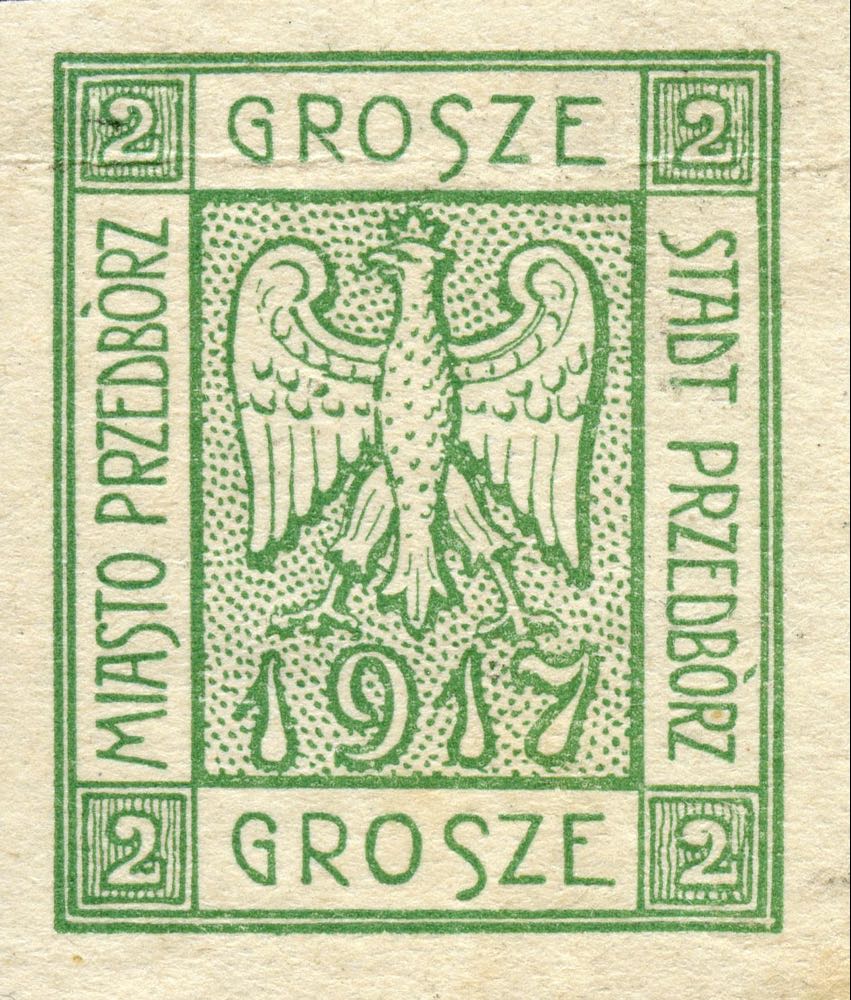1917. Eagle. 2 Grosze
Genuine vs. Forgeries
1
2
3
4
5

1
Two fine lines goes up from the top of the eagle’s crown to the border; one goes almost straight up, the other about 45° up to the right.
2
Second row of dots drops down at the border, creating a little white space
3
Dot attached to the edge of the wing, but doesn’t touch the ‘U’ to the right
4
Mouth of ‘G’ in Grosze is about 0.2 mm open, G is about 1.3-1.4 mm wide
5
Top and bottom of the Z are about 1.4-1.5 mm wide, and pretty much horizontal. The top and bottom of the Z line up to within about 0.005-0.01 mm.
Genuine Fischer #1 / Michel #1
There are 8 different genuine types, but all have the characteristics above
Forgery type I
- – No dot on left margin of wing.
- – There are three coarse dots at the top of the eagle’s crown.
- – There’s a “Fat-G”, about 1.6-1.65 mm wide vs. 1.35-1.4 mm in genuine stamps.
- – There’s a “short-top Z” in which the top bar of the lower Z is about 1.2 mm long vs. 1.4-1.45 mm on genuine stamps. The top bar starts about 0.2 mm to the right of where the bottom bar starts.
Forgery type II
- – No dot on left margin of wing.
- – There is a coarse blotch at the top of the eagle’s crown.
- – There’s a “slope-top Z” in which the top bar of the lower Z slopes up slightly.
Forgery type III
- – No dot on left margin of wing.
- – There are no lines to the margin from the top of the eagle’s crown.
- – There’s a “Tight-Mouth G” in which the mouth opens only about 0.1 mm.
- – The lower leg of the Z slopes down slightly to the right, and is about 1.6 mm long (i.e., slightly longer than in genuine stamps).
Forgery type IV
- – The dot on the left margin of wing touches the “U”, but not the wing margin.
- – There is one thick line to the margin from the top of the eagle’s crown.
- – There’s a “Wide-mouth G”, with the mouth about 0.4 mm open, vs. 0.2 mm on genuine stamps.
Forgery type V
- – No dot on the left wing margin.
- – There is one wide line to the margin from the top of the eagle’s crown.
- – There’s a “Ultra-wide-mouth G” which opens about 0.6 mm at outer edges, vs. 0.2 mm on genuine stamps.
- – There’s a “half-top Z”, with top of the lower Z is about 1.0-1.1 mm long, vs. 1.5 mm on the bottom leg, and 1.4 mm on genuine Z’s. (The “half-top Z” is actually a misnomer because the width is about 70% of genuine, instead of half.)
Thanks to Sam Ginsburg for images and analysis of Przedbórz forgeries







